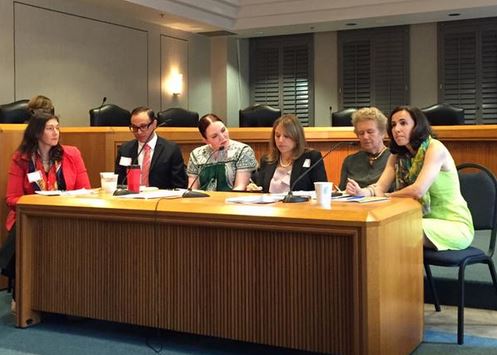Reporting from the FEC

Earlier this week, Parity’s director, Marni Allen, served on the Crafting Solutions Panel at the Federal Election Commission’s Women in Politics Forum #FECWIP in DC. Conversation focused on how to encourage more women to seek elected political office and examined the complex reasons contributing to the dearth of elected women in the United States. Marni’s proposed solutions included three salient points:
- Change the narrative. Women are rational decision-makers. They want to pursue professional paths that will generate positive change and because of their oftentimes negative perceptions of government, they fail to see public service as a venue for the impact they seek. In a recent study of policy and law students, the majority of women described politics as “angry, white, and male.” This assessment does not project a welcoming environment. If we value bringing new perspectives to governance, it’s critical to change the narrative and highlight stories of success, even in a gridlocked Congress.
- Recruitment methods are stale and inconsistent. Women are frequently not connected to the informal networks and ‘old boys clubs’ that make decisions about candidate identification and provide much-needed access to resources during campaigns. To deepen the bench, party leaders and gatekeepers must prioritize broadening existing recruitment efforts. We know that when women run, they win, but they must be asked – and they must be convinced that the necessary supports will be provided. Deliberate recruitment strategies and mentorship must be in place to ensure that the inflow of women to Congress remains higher than those leaving office.
- The field is fragmented. There are a wide variety of organizations focused on women’s political leadership working across the nation. However, their collective reach is limited by a lack of collaboration that would create a consistent web of support and resources for potential female candidates. In Political Parity’s Shifting Gears report, women overwhelmingly indicated (over 90%) that the need to raise substantial funds as the biggest obstacle to considering a run for higher office. Women-oriented PACs offer needed access to donors, but they can’t cover the breadth of need. While EMILY’s List helped raise and direct nearly $40 million in the 2014 cycle, emerging political newcomers struggle to gain access. And no equivalent counterpart exists for Republican women, who are outnumbered in Congress 3 to 1 by female Democrats.
Other speakers on the panel addressed international examples as potential solutions for the United States, highlighting the need for massive structural reform. One speaker focused on the need to change labor practices to better accommodate women with children.
Watch the full event unfold here or check out the buzz generated on Twitter.
